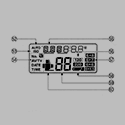|
Alereon posted:They wanted to get as much bandwidth as possible within reasonable cost and power constraints. The optimal way to do this would typically be to have a very wide, slow bus, for example a 1Ghz 512-bit bus. The issue is that this would require at least ~600 additional contacts on the bottom of the CPU, plus routing of those traces on the substrate, which would be hideously complex and expensive. Every watt drawn by the eDRAM is a watt not going to the CPU or integrated graphics (or another watt sucked from the battery), so just clocking the hell out of the memory on a narrower bus wasn't really a workable solution. What they settled on was using a very fast, low-power serial link to a larger, slower eDRAM die, providing a good balance of bandwidth, cost/complexity, and power usage. Seems like power won't be an issue for desktop parts but the other routing and space constraints exist not to mention having a different design for the desktop is another manufacturing cost. Still fun stuff. I'm down for system memory to be on die or even another socketed chip. I'd gladly pay for tighter integration.
|
|
|
|

|
| # ? Jun 11, 2024 10:09 |
|
.
sincx fucked around with this message at 05:55 on Mar 23, 2021 |
|
|
|
karoshi posted:My google-fu is failing me, I can't find an in-depth benchmark of similar CPUs with and without L4. But I don't expect the L4 to make a 2-digit difference in any non-graphic benchmark. It's a waste of money if you get a discrete GPU. Anyway, I would buy one if I was rich, possibly in an ultra-book. But I'm a nerd. In the parts picking thread there should be no references to a L4 CPU, unless they added a "I'm rich bitch" build. Shaocaholica posted:Seems like power won't be an issue for desktop parts but the other routing and space constraints exist not to mention having a different design for the desktop is another manufacturing cost. Still fun stuff. I'm down for system memory to be on die or even another socketed chip. I'd gladly pay for tighter integration. sincx posted:How fast is the embedded on-die ram on the Xbone? What about the GDDR5 on the PS4? E: Remember that you should only quote bandwidth in one direction, you'll see sources quoting double the real numbers because they add together the read and write bandwidth, which is not correct. Alereon fucked around with this message at 23:21 on Jun 5, 2014 |
|
|
|
sincx posted:How fast is the embedded on-die ram on the Xbone? What about the GDDR5 on the PS4? Specs are something like 100GB/s @ unknown clock rate; ps4 is 8GB of gddr5 at 5.5GHz/ 175GB/s Nobody's gonna argue that the sony didn't luck out on the component prices for GDDR5.
|
|
|
|
This is the first full review of the i7-4790k I have found, lets hope that this guy was just unlucky and that this isn't typical. While it ran cooler than an i7-4770k it had very little additional overclocking headroom. http://www.pcper.com/reviews/Processors/Intel-Core-i7-4790K-Devils-Canyon-Review-and-Overclocking
|
|
|
|
.
sincx fucked around with this message at 05:55 on Mar 23, 2021 |
|
|
|
If results like that become typical, AMD's graphics cards and Intel's processors will be approaching parity in terms of behavior - and the extremes and total disregard for the life of the product required to yank more performance out of a product engineered for efficiency at a given node. Aftermarket cooling in an age where overclocking has been sacrificed for the sake of efficiency* becomes a desire for a quieter rather than a faster computing experience, though we really already knew that in the long run. I guess at least I only have to look at buying a new motherboard, at least, that's nice I guess. *Well, sacrificed is a strong term - overclocking has never been their goal, just a fringe thing, it's waste and nearly impossible to validate etc. etc. hit the ? for more pontification on that track.
|
|
|
|
Agreed posted:total disregard for the life of the product required to yank more performance out of a product engineered for efficiency at a given node. What? I have no clue what's going on in your post in general but especially this part about the "life of the product" stuff.
|
|
|
|
beejay posted:What? I have no clue what's going on in your post in general but especially this part about the "life of the product" stuff. Sorry, cross-linked thought from a discussion that happened in the GPU thread regarding AMD's engineers discussing the way that their cooling system works with Hawaiian Islands and the fact that, yeah, they run really hot, but sticking a cooler on them that's better tends to primarily let you hit max clock at lower temperatures (and lower noise) rather than actually make the thing run faster. There's not a lot of extra headroom there to grab, because there's just not a lot of waste in the design. Everybody's engineering toward this, it's not just Intel that faces the "well it's cooler but it isn't faster, sorry!" pseudo-problem. Efficiency means getting all the performance you can get out of a chip, which means that overclocking is waning just in general, apart from some really lucky folks who have a chip that can apparently be pushed faster in trade for more voltage and heat (as far as we can validate the integrity and stability of it, anyway). Which is bad. We can't validate for poo poo. They can, we can't, overclocking is a joke, but it's nice to have cooler running parts because that at least means we don't have to deal with obnoxious fan noise. It begins to call into question the application of aftermarket coolers like the one I'm using now - if overclocking isn't the goal anymore, just getting it quieter, all of a sudden the value prospect of shooting for dynamite airflow and impeccable cooling for the processor (or, in AMD's case, the video cards - not quite there yet, but pretty clearing engineering in that direction) skews really quickly downward toward the inexpensive options over the maximum performance options. As far as life of the product, I mean specifically that you can just throw caution completely to the wind and take extreme measures, add a lot of voltage, deal with a lot of heat, and encourage electromigration or precipitous failure all in pursuit of higher clocks, but the way things are going that will become the norm rather than the exception for those building desktop PCs for themselves and overclocking per se. When you have to run something far enough out of spec to actually damage it, potentially severely, just to get a faster clock on it, what's the point? You're not going to break records unless you're doing suicide runs with liquid nitrogen or dry ice, you're just throwing good money after bad for very little return on a processor that you can't trust to last long or be genuinely stable at the lower levels of operation (because, again, we can't validate clocks for poo poo compared to Intel). Enthusiasts are getting marginalized more than ever, but that's okay, honest. It feels lovely to all of us who have been used to less efficient designs, the really golden overclocking SKUs like the later Core2 Duos and Quads or what have you since we feel pretty entitled to be able to actually get some real additional performance out of our computer, and we've typically been able to do so by just dealing with more power draw and the need to dissipate more heat, but it's not going to change the direction of the industry so we'd all do well to try to get used to the idea that factory speeds are already very fast and not worry so much about trying to overclock; instead, just appreciate advancements which make the processors more efficient and cooler running. Lifetime of specific products, the ones people buy and use, not lifetime of the product on the Intel roadmap. Agreed fucked around with this message at 03:09 on Jun 8, 2014 |
|
|
|
Agreed posted:the really golden overclocking SKUs like the later Core2 Duos and Quads or what have you since we feel pretty entitled to be able to actually get some real additional performance out of our computer,
|
|
|
|
Mr Chips posted:
Objection! Thunderbird/Duron! Wait, wrong thread.
|
|
|
|
I see! Yeah I have been overclocking for a long time and it's fun, it always feels good to get "something for nothing" in a way. I was kind of thinking I made a mistake with an Ivy Bridge K processor, and they would come out with better overclocking stuff afterward, but it looks like that may not be the case. I thought you meant the processors would face lifetime concerns at stock with stock coolers, and I was thinking that would be bad.
|
|
|
|
I've a few questions: - Why were Core 2 Duos/Quads such good overclockers? - If manufacturing methods were perfected, would every 4690K suddenly be able to reach the record 5.5 GHz that was achieved with a 4790K at Computex? - Thanks to the rapid cadence of Intel's tick-tock, does electromigration really matter all that much? If I'm going to buy a new processor anyway in 2-4 years why wouldn't I run it into the ground during that time? People who pimp their cars with nitrous injection and whatnot probably care more about performance than resale value - How much of overclocking is actually beneficial and how much is ePeen? Does raising CPU clocks by ~one gigahertz really make a system that much faster if the rest of the components are sound (i.e. 1866 dual-channel RAM, SSD, discrete GPU to help with video encoding)?
|
|
|
|
Welmu posted:I've a few questions: I appreciate the implied vote of confidence, but there are far cleverer folks than me who could answer these questions. I'll still take a swing at them, but understand that this is one man's opinion, and I am a layman compared to many of the actual EEs who work on the development of FPGAs and ASICs or code for big names here. Though some of that probably stops them from being able to give the most complete answers, or even really touching the subject - NDAs weigh a lot in terms of what they can do to ya if you unintentionally break them and it's discovered, let alone if you act in bad faith and intentionally break them. 1. My thoughts on that is because Intel conservatively rated them for the sake of market segmentation but also for the sake of validation - their products' specifications are for 24/7 usage, meaning at or close to 100% utilization every second for the life of the product. That manifests in conservative ratings both in terms of stock voltage and stock clocks, if you're willing to sacrifice the durability of the product and risk damage to it. Of course, the usual "we can't validate clocks as well as Intel/AMD/nVidia" applies here. Also, they just weren't as efficiently designed - there's an inherent dichotomy between efficiency and overclockability, because if it's maximally efficient from the manufacturer, you're not going to be able to wring additional performance out of it - they've already given you all it's got! But they have other concerns, too, costs and how they can market them for various purposes and lots of other things that don't really fit into the conversation about enthusiast desktop PC owners. 2. I don't think so, no, because it's not that kind of processor. I mean, define perfected more narrowly and sure we can design them to have long pipelines and be hotter on purpose and ramp up clocks all day long, but it's a bad approach. 3. Subjective. In my experience, yes. My 2600K started blue-screening at 4.7GHz after two years of use because I was running it at 1.38v with LLC set somewhat aggressively just to hit that clock, when I could run much safer settings and do 4.5GHz easily. The performance difference between the two is negligible, but look what I did to my processor in the pursuit of a higher clock, smashing through the voltage and heat barriers with really massive air cooling and aggressive power delivery - I did it, but it is objectively broken now, a little bit, it just doesn't show up at 4.5GHz at a substantially reduced voltage, with some important overclocking stuff for P67 boards set back to not-so-drastic settings. If I had just run it at 4.5GHz and the safer settings all this time, the processor would probably not have had this issue. I've damaged it and there's no going back from that, who knows when I'll next have to push clock down - or if it'll be able to work when I do the next time it becomes unstable enough to cause real issues? 4. I would argue that currently almost all of overclocking is ePeen and none of it is very useful. Intel has jumped on board the "all cores turbo" and longer turbo times by default with the most recent refresh, a behavior that motherboard manufacturers have been enforcing by default for some time (with the option to disable it). There is very little benefit in day to day tasks from going from a 4.0GHz Haswell based processor to a 4.3-4.4GHz one. Moving my 2600K from its stock up by like a GHz was pretty cool, as was moving my Q9550 that preceded it from 2.8GHz-->3.8GHz. That was real performance gain. But the gap is narrowing, a lot. The days of MAJOR gains for virtually no penalty so long as you have sufficient cooling, and heavy-handed market segmentation is ~mostly over. There's still the intermediary space of overpriced enthusiast parts, the 6-core extreme Ivy Bridges etc., but Intel has always catered to that market because it does exist and having record high clocks is worth some prestige. They don't base much off of that other than "Look what we can do
|
|
|
|
2. By "perfected manufacturing methods" I assumed that since all CPUs come from slabs of silicon but because small irregularities creep in they're binned accordingly. If each CPU was an utterly identical mirror copy of each other, wouldn't that turn all chips into the very best of cherry-picked ones in terms of overclockability? 3. Intel CPUs have a warranty of three years. If I kill it via O/C in slighty over two, I can get a new one, especially if I bought the 25$ Performance Tuning Protection Plan. Even if I didn't, there's no way the store I buy stuff from could tell that extreme overclocking is the reason Prime95 fails / Windows bluescreens. 4. I thought as much. The majority of overclockers, especially teenagers with way too much cash building EXXXTREME 6-core rigs are basically pissing money away for little to no actual benefit beside bragging rights that last until the next processor is released and they fade from PiFast / 3DMark High Score tables. Still, it is pretty Welmu fucked around with this message at 09:14 on Jun 8, 2014 |
|
|
MaxxBot posted:This is the first full review of the i7-4790k I have found, lets hope that this guy was just unlucky and that this isn't typical. While it ran cooler than an i7-4770k it had very little additional overclocking headroom. Hopefully not representative. Realistically though I'm hoping that a Haswell chip can somehow reliably reach +600 mhz over the almost-identical previous "version" overclocking via cherry picking dies (I know thermals are the big fix, but even delidded 4770k's could hit a wall at 4.4). It was the implication though. Totally arbitrary and pointless limit I set for myself, but if I can't likely get 5.0 out of it I probably won't get it at all. Which is probably a good thing for my wallet.
|
|
|
|
|
Welmu posted:2. By "perfected manufacturing methods" I assumed that since all CPUs come from slabs of silicon but because small irregularities creep in they're binned accordingly. If each CPU was an utterly identical mirror copy of each other, wouldn't that turn all chips into the very best of cherry-picked ones in terms of overclockability? Ah! Well, number 2 is pretty much impossible, and less and less so as we go to lower nodes and start looking at different materials (since we're reaching the atomic limits of how big the transistors can be with silicon and issues are popping up, I know not what, but it's the kind of thing that slows down the aforementioned rapid cadence of tick/tock to more like tick/tiiiick/tock as seen with the huge delay we've got right now. We're not even down to the theoretical minimum nanometer using some fancy distributed work to leverage multiple silicon atoms into a single transistor if necessary, should we keep going with silicon down to that point, but it's already alarmingly difficult to make the products smaller and thus more efficient and faster running, all other things set aside. BUT, yes, if you could pretend all of that is not reflective of reality, in that case you would get every chip being an ideal chip. What that means is difficult to say, because we don't know what lengths anyone went to to validate highest clocks; from what I can tell, this generation all it'd mean is that you'd have artificially limited chips below 4.0GHz stock clocks, since that's where Intel says "these are good to go!" and we have to trust Intel on that one. Number 3, I've got the warranty and I guess I could try cashing it in, but it's just such a pain in the rear end and I have everything needed to build a Haswell system anyway (except that ballin' new motherboard platform, yowza! sub-70 dpc latency here I come Number 4, yep. The really old GREAT overclockers, like the aforementioned Celeron 300A, had some unique feature about them that made them really stupidly good - that one, as I recall, was that it had less L2 cache, but it put it right on the processor, which allowed it to actually have superior performance compared to the Pentium at the time, and it could also be overclocked to hit similar clocks as the $600 Pentium of its era (which had 512K of L2 cache but placed it in such a way as the processor had much more limited access to it). What was originally a market segmentation thing, sort of a "well we need to service the lower end of the market, but at the same time we can't just have it perform like TOTAL poo poo, so we'll compromise and do this neat thing and it'll be okay for E-Machines and stuff!" turned into an overclocker's best friend. The Durons that I mentioned earlier could be bought for like $120 or less and could be clocked to performance parity with the Athlons that were running $300+ at the time just by joining some bridges on the die with a conductive pin. Those were the days. Not every chip was golden, but when market segmentation was the more explicit goal and manufacturers/fabs didn't really know how to wring the most efficiency out of the product - it was not the priority - that left a lot of room for tuning for enthusiasts. Now that's much less the case, going forward it should be DRASTICALLY less the case until it just isn't the case at all, and if you examine it closely we're honestly better for it; but it's lovely too because man I like overclocking drat it. 
|
|
|
|
Welmu posted:I've a few questions: Yeah, if they were able to manufacture every chip as a mirror copy of that chip able to hit 5.5GHz then they would all have that capability. quote:- Thanks to the rapid cadence of Intel's tick-tock, does electromigration really matter all that much? If I'm going to buy a new processor anyway in 2-4 years why wouldn't I run it into the ground during that time? People who pimp their cars with nitrous injection and whatnot probably care more about performance than resale value They're still doing the tick-tock but it's not resulting in the same sort of gains that it used to. Sandy Bridge is well over 3 years old now yet it's still basically neck and neck with Haswell when overclocked because it has more overclocking headroom. That said, it's not likely that you're going to burn out your processor with a modest overclock even if you do keep it for a couple years longer due to the slowing pace of performance increases. quote:- How much of overclocking is actually beneficial and how much is ePeen? Does raising CPU clocks by ~one gigahertz really make a system that much faster if the rest of the components are sound (i.e. 1866 dual-channel RAM, SSD, discrete GPU to help with video encoding)? If the task is CPU intensive overclocking will definitely help, if you can get 1GHz of real overclock that would certainly make a difference. The point isn't that "overclocking is epeen" it's that overclocking is slowly being phased out essentially. Turbo boost narrows the gap between stock clocks and what you'd get while overclocked. Newer chips are being sold with less headroom than they used to have. Smaller process nodes have voltage/power consumption characteristics that are not amenable to overclocking. When you feed these chips more voltage their power usage and heat ramps up faster than they used to on larger nodes. All of these factors contribute to make overclocking less appealing from a price/performance standpoint. When you could buy a $30 cooler and overclock your Sandy Bridge from 3.4 to 5GHz that was definitely not epeen and actually added real value to the system, but those days are probably permanently over. MaxxBot fucked around with this message at 17:45 on Jun 8, 2014 |
|
|
|
^^^ Yeah probably so. Another ghz or more is no joke, but the factory clock on the new 4790k is just so great out of the box. For the time being since the 4690k is still at 3.6 it's worth overclocking to me even if you "only" get 4.5-4.6, but I can see the trend you're talking about.
|
|
|
|
|
If I were to compress all the poo poo I wrote above into a single thought, it'd be: "Ohm's Law + quantum physics = sorry enthusiasts, but for what it's worth we'll be getting some seriously well-designed and already-very-fast processors anyway!"
|
|
|
|
Reading this thread kinda makes me feel glad to have a slow computer so I have something to look forward to instead of being let down about the state of CPU upgrades.
|
|
|
|
I'm not really feeling let down by my 2600K. It's nice having a ~3-year-old PC where the only upgrade I've wanted is the GPU. I did get a bigger SSD though as the 128GB 830 was feeling a little cramped.
|
|
|
|
 OK, maybe I will de-lid and get an aftermarket cooler 
|
|
|
|
You are running a shitload of power through that processor. Like, precipitous hardware failure high. It has tiny tiny little transistors, V=IR, resistance rises with heat, and your voltage is really high as well. Recipe for death. What clock are you getting in exchange for attempting to fry your CPU? And what possessed you to attempt overclocking on the stock cooler? I say that because, holy hell, your package power is like twice the thing's TDP and then some  You have to be able to dissipate that heat or even the most aggressive throttling will not prevent damage to the processor if it gets and stays that hot for any length of time! You have to be able to dissipate that heat or even the most aggressive throttling will not prevent damage to the processor if it gets and stays that hot for any length of time!
|
|
|
|
cisco privilege posted:I'm not really feeling let down by my 2600K. It's nice having a ~3-year-old PC where the only upgrade I've wanted is the GPU. I did get a bigger SSD though as the 128GB 830 was feeling a little cramped. I can't even do that. Dual 6870s are still really good.
|
|
|
|
Summary of Devil's Canyon overclocking results that I've seen so far: PC Lab [polish]: -18C OR +100Mhz vs 4770k (4.8Ghz) Hexus.net: No stable overclock (4.4Ghz) PC Perspective: -4C stock vs 4770K, -100Mhz overclock (4.7Ghz) Digital Storm: -7C stock vs 4770K, +400Mhz overclock (4.8Ghz)
|
|
|
|
Despite itself, DC almost seems to be an argument against overclocking more than anything.
|
|
|
Panty Saluter posted:
That is really hot. If you're implying you have a stock cooler at 1.34 vcore then I'd have to like wave my arms and scream how bad of an idea that is. I run higher voltage (~1.36), though it is 20 degrees cooler with linpack. 60 degrees full real loads. That's the only way I'd ever suggest using that much voltage. I compiled some scientific data to explain what I mean 
|
|
|
|
|
At the time of testing? 3.8 gHz  All I'm running is higher FSB speed (800 vs. 667), so maybe that's contributing? Also I used Gigabytes overclocking software, which may be part of the issue. Guess I'll turn it back to stock for now, I didn't think such a mild overclock would beat the poor thing so hard. Guess that could explain some of the stability issues All I'm running is higher FSB speed (800 vs. 667), so maybe that's contributing? Also I used Gigabytes overclocking software, which may be part of the issue. Guess I'll turn it back to stock for now, I didn't think such a mild overclock would beat the poor thing so hard. Guess that could explain some of the stability issues  On the upside we don't have to use the kettle to make tea anymore. edit: it worked great for the first couple of weeks so I didn't worry about it much. More recently it's been...flaky. Panty Saluter fucked around with this message at 15:56 on Jun 9, 2014 |
|
|
|
Hace posted:Despite itself, DC almost seems to be an argument against overclocking more than anything.
|
|
|
Panty Saluter posted:At the time of testing? 3.8 gHz If you let the software handle the voltage (autotune) then that is why for sure.
|
|
|
|
|
Yeah I just uninstalled all that poo poo and cranked the BIOS settings back to default. I noticed it was still hitting about 110W during stress testing; is that sort of overshoot normal? Is the TDP calculated without the TurboBoost? According to the BIOS it should be limited to the stock TDP.
|
|
|
|
I'm sure all of you gurus are going to laugh at me, but is the 4790K a pointless purchase if I don't really plan to overclock it? Or would it still be a good chip to get for running stock?
|
|
|
Panty Saluter posted:Yeah I just uninstalled all that poo poo and cranked the BIOS settings back to default. I noticed it was still hitting about 110W during stress testing; is that sort of overshoot normal? Is the TDP calculated without the TurboBoost? According to the BIOS it should be limited to the stock TDP. Honestly I've never gone off watts although I probably should. Just vcore, vrin, cache voltage, and heat. Vcore and heat being the big ones. MisterAlex posted:I'm sure all of you gurus are going to laugh at me, but is the 4790K a pointless purchase if I don't really plan to overclock it? Or would it still be a good chip to get for running stock? It's no longer totally dumb like it used to be. You are getting the fastest factory speeds possible. The real question is if you need and/or can use n hyperthreaded 4.4 ghz processor. But as far as 4790 and 4790k ... I'd so probably say so honestly. The price difference isn't that huge (compared to the base cost you're already putting down)
|
|
|
|
|
What the hell processor are you running that still has a FSB?
|
|
|
|
KillHour posted:What the hell processor are you running that still has a FSB? ...or whatever the hell it's called now, I don't know. Don't torture the aged  I'm still hitting 1.248 Vcore even now and 90ish on temps. Really Intelburn should be an outlier case but it's still a little disturbing.
|
|
|
|
Panty Saluter posted:...or whatever the hell it's called now, I don't know. Don't torture the aged No seriously, there's nothing on a 4670K that can be set to 666mhz or 800mhz. That's definitely a FSB speed. Also, 3.8ghz is rather slow for that proc. I'm at 4.4 on a 3570K with no issues.
|
|
|
|
Backside bus
|
|
|
|
KillHour posted:No seriously, there's nothing on a 4670K that can be set to 666mhz or 800mhz. That's definitely a FSB speed. Well remember this is still the stock cooler so I wasn't trying to get too crazy. HWInfo tells me the CPU fan is hitting 2000 RPM but it doesn't feel like it's moving much air (I'm sure it isn't). The whole mess started with me bumping my RAM to an 800 mHz clock from 667. There was a small bump in CPU speed that corresponded with that change, or at least that's how it appeared to me.
|
|
|
|

|
| # ? Jun 11, 2024 10:09 |
|
Panty Saluter posted:Well remember this is still the stock cooler so I wasn't trying to get too crazy. HWInfo tells me the CPU fan is hitting 2000 RPM but it doesn't feel like it's moving much air (I'm sure it isn't). Ah. You can usually just do that with a RAM multiplier. You shouldn't ever need to touch the BCLK. Step 1: Buy this. Step 2: Leave your voltage at stock Step 3: Set your multiplier at 40 and leave your BCLK at 100. Step 4: Run testing tools IF (not stable) Reduce multiplier by 1 ELSE Step 5: Profit! Anything more complicated than that, you want to ask in the overclocking thread.
|
|
|























